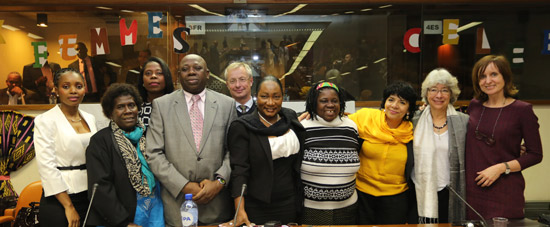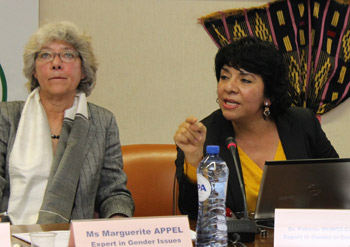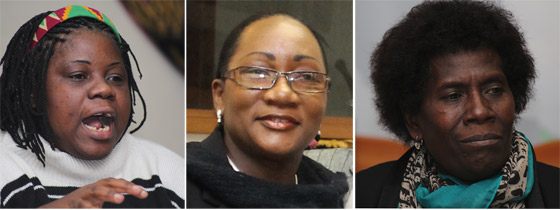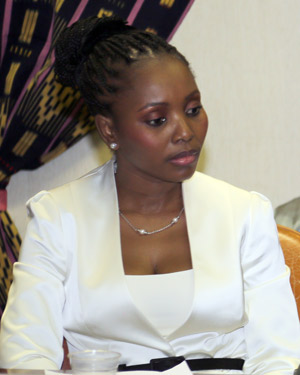Women’s Day fête honours “transformative” power of gender parity

Brussels, 10 March 2014/ ACP: International Women's Day was celebrated at ACP House on Friday, March 7th with a series of compelling presentations under the theme “ACP Women: Actors in Development”, capped off by a prize-giving ceremony, and an impromptu fashion show.
The ACP Secretary General H.E Alhaji Muhammad Mumuni set the tone for the event, reminding the meeting that “for a nation to rise to the heights of its economic and social potential, it needs to invest equally in its entire population – not just the male half.”
“Women's empowerment is not an act of charity nor is it an expression of humanitarian compassion for women. It is a recognition of a right, as women's rights are human rights.”
Mr. Mumuni cited a report by the World Economic Forum showing that countries with the least gender gaps are the most economically competitive. Studies also suggest that the economic participation of women drives household income growth.
“This is what the United Nations High Level Panel of Eminent Persons on the Post-2015 Development Agenda refers to as the “transformative power”of women's equal participation,” he said.
Outstanding women's initiatives
As a keynote presentation, two experts in gender and development issues presented initial findings from a study they are currently conducting on behalf of the ACP Secretariat, funded by the European Union. 
Dr Patricia Munoz-Cabrera and Ms Marguerite Appel (pictured right) seek to highlight women's significant role and contribution to development in ACP countries by documenting outstanding initiatives by women from all three regions, in eight development sectors.
Key trends they cited include the holistic, multidimensional approach grassroots women take to development; the link between micro and macro levels and the need for policy coherence between the two; the need to link women's leadership amongst different social sectors, generations, or communities to address social inequalities; the potent agency of women in driving socio-economic development; and the prevalence of social and cultural norms that discriminate against women in ACP regions.
“Women's experiences deserve to be scaled up, not only by expansion, but particularly in moving them into policy level,” said Ms. Appel. “[In our case studies] we are assessing their added value and potential for scaling up and replication to other regions.”
Examples of notable initiatives include the South Kivu Women's Media Association based in the Democratic Republic of Congo, where a network of female journalists risk their lives by broadcasting radio programmes and opening dialogue on violence against women. In the Pacific, the WARA project in the Solomon Islands have established “lending clubs” for women, giving them economic agency while also training them on finance and money issues. Another example was the Jamaican Network of Household Workers, which started as a small group of struggling women and grew in to a national union, on its way to getting the Jamaican Government to ratify the ILO's Convention 169 on labour rights and decent work for domestic workers.
Voices from the ground
Visiting guest speakers also took the floor to share their personal experiences from the field.

St Lucia entrepreneur Ms. Flavia Cherry (pictured above, middle), who is also Acting Chairperson of the Caribbean Association for Feminist Research and Action (CAFRA) and President of the Civil Society Network in St Lucia talked about successful business and trading initiatives for women in her country, including lessons learned and good practices.
Ms Rosemary Olive Mbone Enie (above, left), a Cameroonian Geologist and Gender Ambassador for the Gender and Water Alliance (GWA) in the Netherlands, shared highlights from her work over the past two decades in the field of water, sanitation, hygiene, sustainable development and environmental management at grassroots levels in Cameroon, Nigeria, Ghana, South Africa, Kenya, Liberia and Tanzania, where she is now based.
Finally, Ms. Helen Hakena (above, right), co-founder and Director of the Leitana Nehan, Women's Development Agency in Bougainville, Papua New Guinea (PNG) gave a moving and account of her organisation's fight for gender-just post-conflict development, women's socio-economic empowerment, and women's political participation.
ACP women in Brussels 
From the Brussels base, President of the ACP Ambassadors' Spouses Association Mme Smngele Nkosi (pictured right) of South Africa reiterated the association's commitment to women's development, having gifted more than 50,000 Euros over the past three years to projects in Haiti, Sierra Leone, Solomon Is, Swaziland, and Vanuatu. Their aim is double efforts in the next three years.
The ACP Secretariat also gave out long service awards for five exemplary women from the staff, including Mme Helene Fiagan, Ms Josephine Byalugaba, Ms Patricia Goodwyll, Ms Faith Kakiiza and Mme Stefanie Ndakoze.
The evening ended with a parade of African women's fashion, along with a cocktail dinner and dancing.
– ACP Press
(Photo top: The ACP Secretary General with keynote speakers, panellists and distinguished guests, including Mr Denis Salord, Head of Unit at the EU Commission for Development and UN Women Brussels Director Ms. Dagmar Schumacher (far right)/ Photos by Alec Singh)
